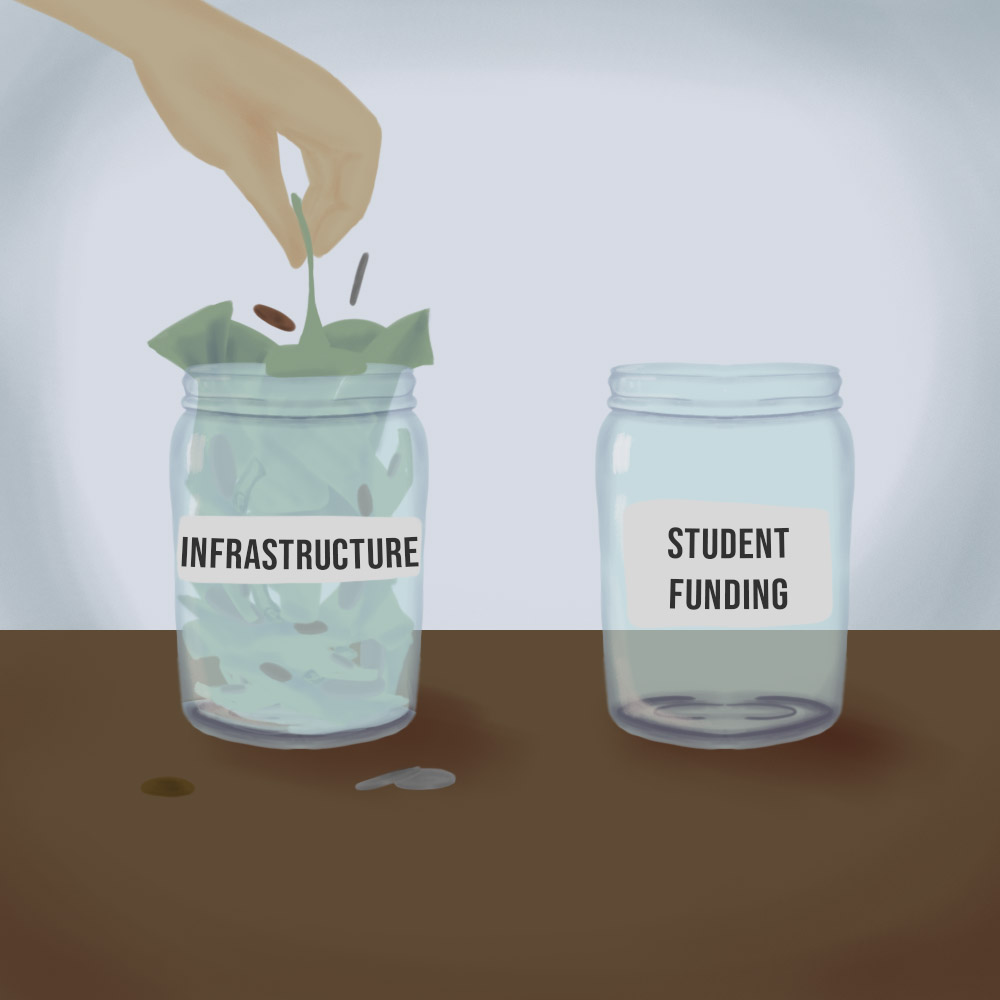
Graphic by Astrid Hernandez | Mercury Staff
When profit takes precedence, students suffer
Cranes, orange street signs, dirt and neon yellow jackets
have all become sights UTD students see while making their way to class while
walking and riding on the few roads left untouched by construction. Many try to
imagine how the new buildings will blend in upon completion, while others
attempt to remember, ever so vaguely, how the now blocked-off parts of campus
used to look. Although it seems as though the university grounds are undergoing
simple and much needed improvements, construction is one of the many
consequences of financialization, a detrimental process that threatens the
future of higher education.
Financialization is a term used to describe the development
of financial capitalism and the growth of the nation’s financial sector in the
late 1970s and 1980s due to widespread deregulation of the economy. With
progressive reforms dominating the Gilded Age, many believed that fewer
regulations would lead to increased competitiveness, lower prices and eventual
economic growth. According to an article written for the North Carolina Banking
Institute, “Financialization: Causes, Inequality Consequences, and Policy
Implications,” economic deregulation contributed to the expansion of banking
and financial service industries, as well as the normalization of risk
associated with the financial collapse of the late 2000s. The stage was set for
financialization to infiltrate both the economy and the system of higher
education.
Although UTD was only founded in 1961 and joined the UT
System in 1969, the university has not been immune to financialization and, in
fact, there are evident traces of it on campus today. The aforementioned
construction is only one example. UTD’s refusal to invest into a football
stadium at the expense of academic programs is well justified. However, the
funds that could be going towards scholarships and fellowships to reduce the
accumulation of student debt are instead being diverted toward infrastructure.
Emails introducing new faculty members surface in student inboxes much too
frequently. Joining a team of UTD’s faculty, staff or administrators requires
an increase in the amount of money outgoing towards salaries.
While continuous infrastructure projects and renewal of
campus staff may seem like positive investments in the long run, the recent
reduction in the amount offered by Academic Excellence Scholarship packages and
elimination of the $3,000 stipend per semester, both intended to reward
academic achievement, reflect the need to increase student tuition rates and
fees to offset the lack of state funding. Budget cuts to higher education have
frequently been made by states since the 2008 recession, which inevitably
caused universities nationwide, including UTD, to raise tuition rates.
According to a report released by the Roosevelt Network,
“Financialization of Higher Education,” gambling with interest rate swaps, a
complex and risky financial tool, has cost 19 schools approximately $2.7
billion. The report claims that Wall Street has “preyed” on the financial
hardships faced by universities nationwide. Upper-level jobs are increasingly
occupied by individuals with financial backgrounds who prioritize profits over students,
faculty and staff. Moreover, lack of accountability contributes to the growing
influence the financial sector now has over higher education.
Financialization, a process that reflects the financial
sector’s merciless thirst for profits, comes at a high cost with little to no
benefits in return. Luckily, universities tend to be hubs of innovation and
progressive movements. Joining student-run advocacy organizations, spreading
awareness to peers and followers on social media, building coalitions and
developing campaigns are only a few options that students can choose from when
entering the fight against financialization. UTD has its own chapter of the
Roosevelt Network through which students have the opportunity to start the
conversation and gather a group of supporters. In addition, experts like UTD
political science professor Robert Lowry are currently conducting research on
similar issues.
Although it seems difficult to stand up to an issue backed
by decades of precedent, it is important to realize that financialization of
higher education does not continue to exist because it is widely accepted by
society. On the contrary, it has survived only by lurking in the shadows,
accompanied by little-known truths. Spreading the message to one other person may
be all it takes to trigger a chain reaction of positive change that will ensure
economic freedom for students, professors, campus workers and universities
nationwide. Building affordable academic futures is no doubt a more worthy
investment than the next science building.